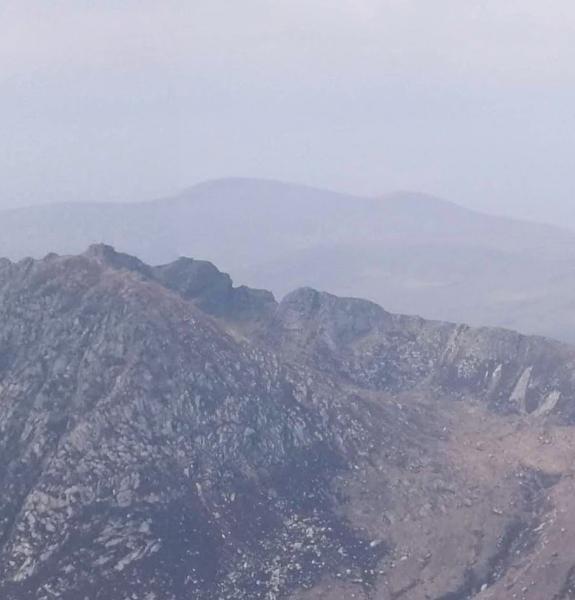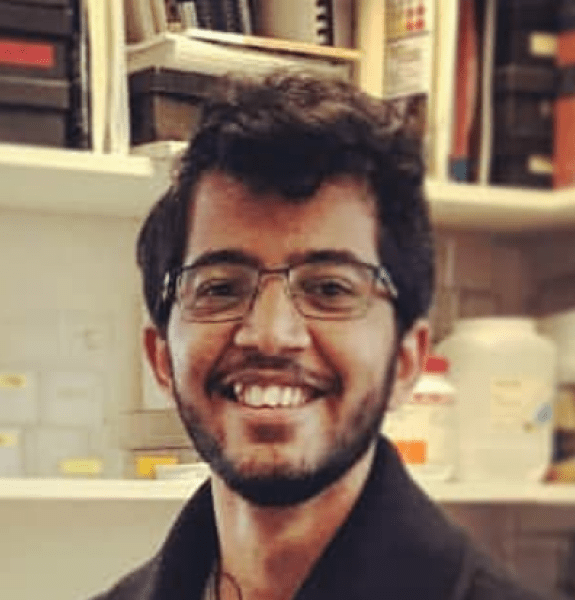Rachel wrote this at the end of her first year studying Natural Sciences (Biological) here at Christ's College, Cambridge. She is from Guildford, South-East England and did A-levels in Chemistry, Biology, Physics and Maths.
What attracted you to your course?
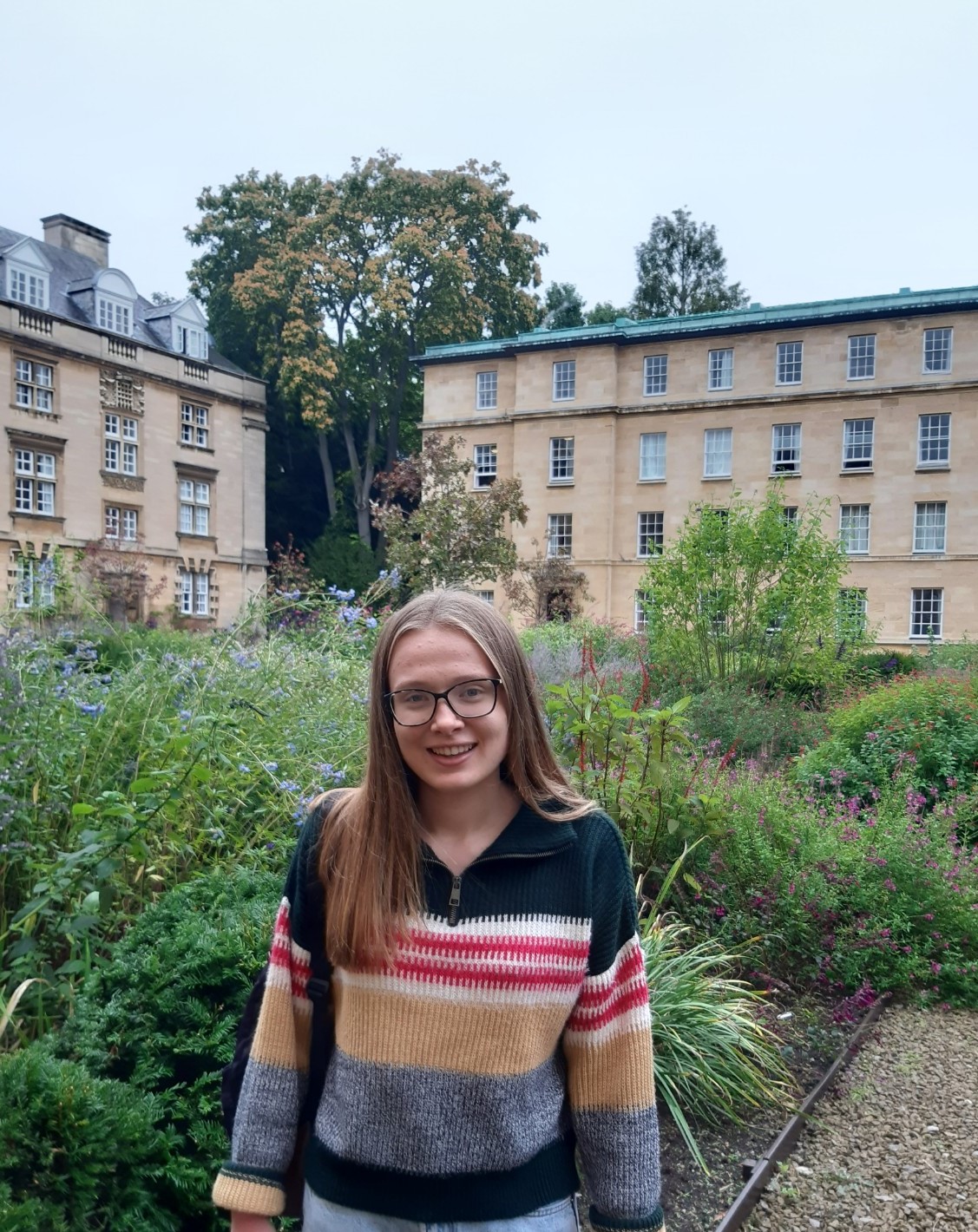
I was attracted by the breadth of the Natural Science course. I liked that you don't have to decide what you want to specialise in too early. I'm a very indecisive person, and it stressed me out to look at other courses where you need to decide if you want to do a biochemistry degree, biomedical science, or genetics right from the start. I didn't know what strand of biology I wanted to go down, and I also really enjoyed Chemistry at A-level and wasn't ready to let it go. I've decided now that I don't want to do Chemistry next year, but it's been nice to have another year to work all of that out! Other universities do offer Natural Sciences courses, but they tend to be a case of picking out a couple of sciences from the ones they offer, whereas at Cambridge, this is the default way science is taught. I'm really glad that I got the opportunity to do this, I went into first year thinking I would be most interested in the Physiology side of the course; I applied for Biomedical Sciences elsewhere. Actually, I didn't enjoy that course as much as I thought I would, but I really liked Cell Biology. I'm really glad I got chance to see what I wanted to do, otherwise I would have ended up doing something I was less keen on.
Were there any course things you were nervous about?
I was a bit worried about essay writing: it wasn't something I had done much of before, especially as Covid-19 meant I didn't do the essay portion of A-level biology. But there's a lot of support to help you: your supervisors definitely aren't expecting perfect essays to start with. It's also important to realise that the whole course is a learning curve. I'm at the end of my first year and I'm still working on my essay technique. I think I've worked out what makes a good Natural Sciences essay in terms of basic requirements, but they are still getting better as I practice more. It's important to note that they aren't the same kind of essays that you think of with humanities subjects: you can include a diagram that might replace a few hundred words; you can say "refer to figure 1" and it might be a whole-page diagram; you can have a table in there that sums up all the information you need, if that's a more efficient way to display it than writing out lots of words.
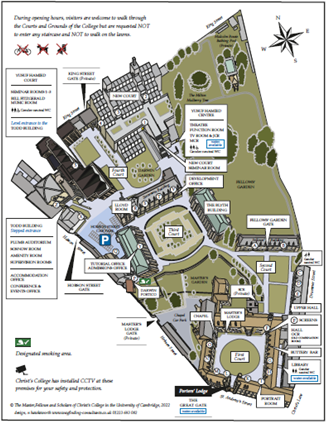
What made you apply to Christ's?
I didn't get the opportunity to visit any of the colleges, so all of my research was done online. I was very methodical about it: I made a table with the pros and cons of each college. These were all sorts of things, from big things like location, to little mundane things like the cost of the laundry.
The fact that laundry is free at Christ's ended up being one of the deciding factors! I ended up weighing up lots of tiny factors: what's more important, a College that is famed for its weekend brunch, or free laundry and college cats? But what it boiled down to was that Christ's is a "Goldilocks college" in a lot of ways. It feels "Cambridge-y" in terms of a fairly grand formal hall, but it's on a small enough scale so it's not intimidating. It's big enough to have on-site accommodation for the full three years if you want it, but small enough that you know everyone and the atmosphere is really friendly.
Has Christ's lived up to your expectations?

Yes! I'd read all about Christ's, but I'd never visited before my first day here, so I was curious to know if all my intense online research had worked out. When I got here, it was so much better than I was expecting, I was confident I'd made the right choice and the research had paid off.
My favourite place in college is the Fellows' Garden. My room last year was in the Blyth building and looked out in that direction, so the Fellows' Garden was the first thing I saw every morning. It was lovely to see the seasons pass through there, and during the summer I loved sitting out there with my friends. When I'm working in my room, looking out onto the garden was really calming: why would I want to work in a library when I could be looking at trees?
Another thing I appreciated was the pool in the summer term. After a day of revision, at maybe four or five in the afternoon, me and my friend would go for a swim: it was pretty much every day at one point, and it was really lovely.
What helped you to settle in?
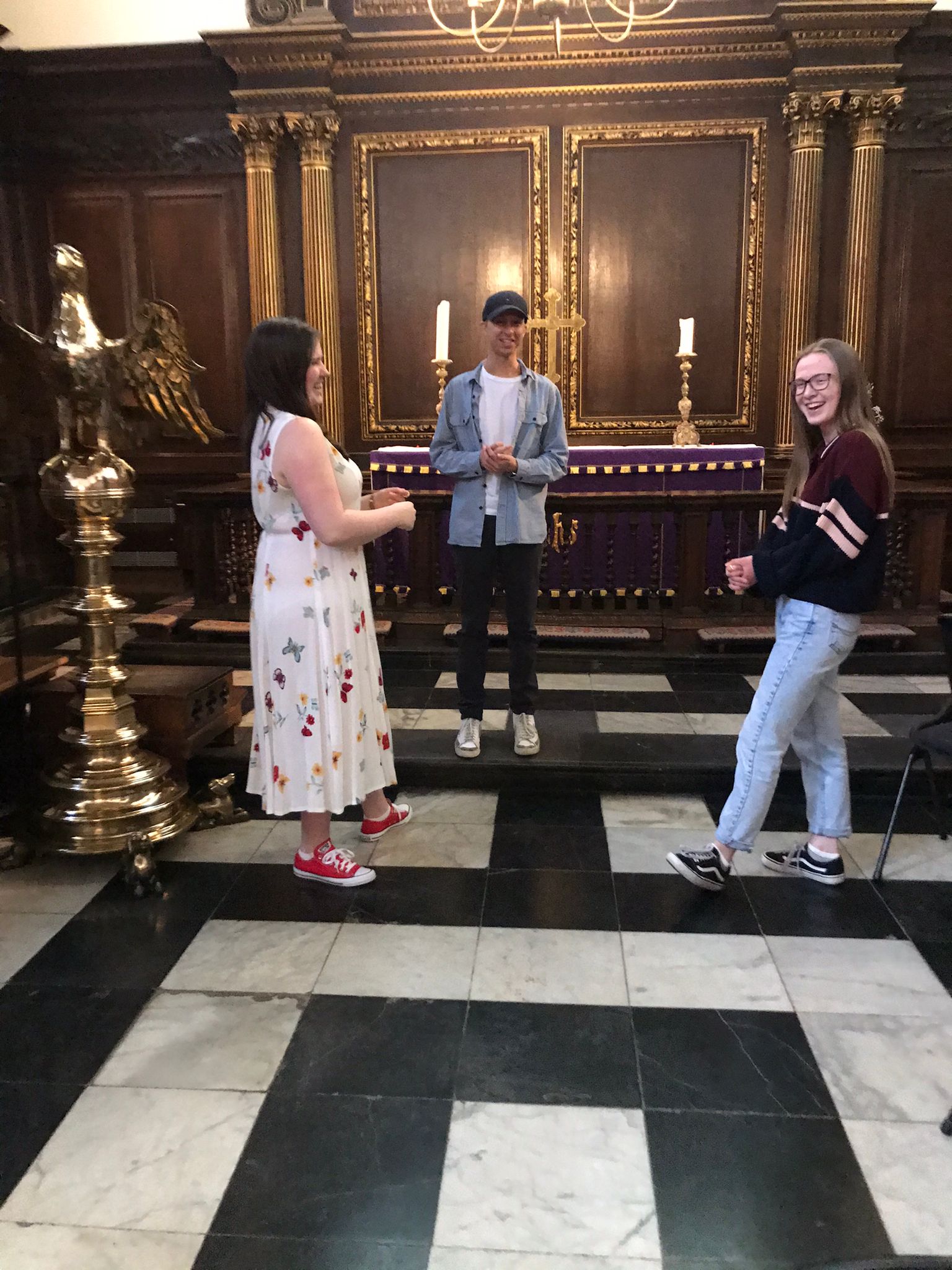
One thing that helped me massively was the 'College Family' system, which is where each first-year is matched with a pair of second-year 'College parents', based on their interests. They don't generally do the same subject as you, although mine happened to both be doing Natural Sciences. The other first-years with the same college parents are then your 'siblings'. we got a letter in the post from our college parents, which was really sweet and helped ease my nerves about starting. I had two amazing college 'mums' who were absolute legends. In freshers' week, they took us out to dinner, and were always a friendly face around College. Mine did other stuff with us too: they hosted a movie night at their shared house on Jesus Lane (just behind Christ's), we had a picnic together, they met all of our friends and so on, it was really nice. I'm really looking forward to having some College children of my own to look after next year!
Another thing that helped was the setup of our Covid-19 households: at Christ's all the year groups were mixed together in the college's accommodation. My corridor was about half first-years and half second- and third-years, and there were a lot of pairs of people doing the same subject in different years. We formed really good friendships with them and the older students around me helped me out a lot. There's a real community of people doing your subject, especially with Natural Scientists. There's 24 of us in our year, and we have formed friendship groups and see a lot of each other. Darwin society (the College's science society) and our subject socials, mean we get to spend time together outside of our studies. Especially as the workload can be heavy, it's comforting to know you have others around you who are doing the same thing, so you can help each other, walk to lectures together and so on.
How did you find the application process?
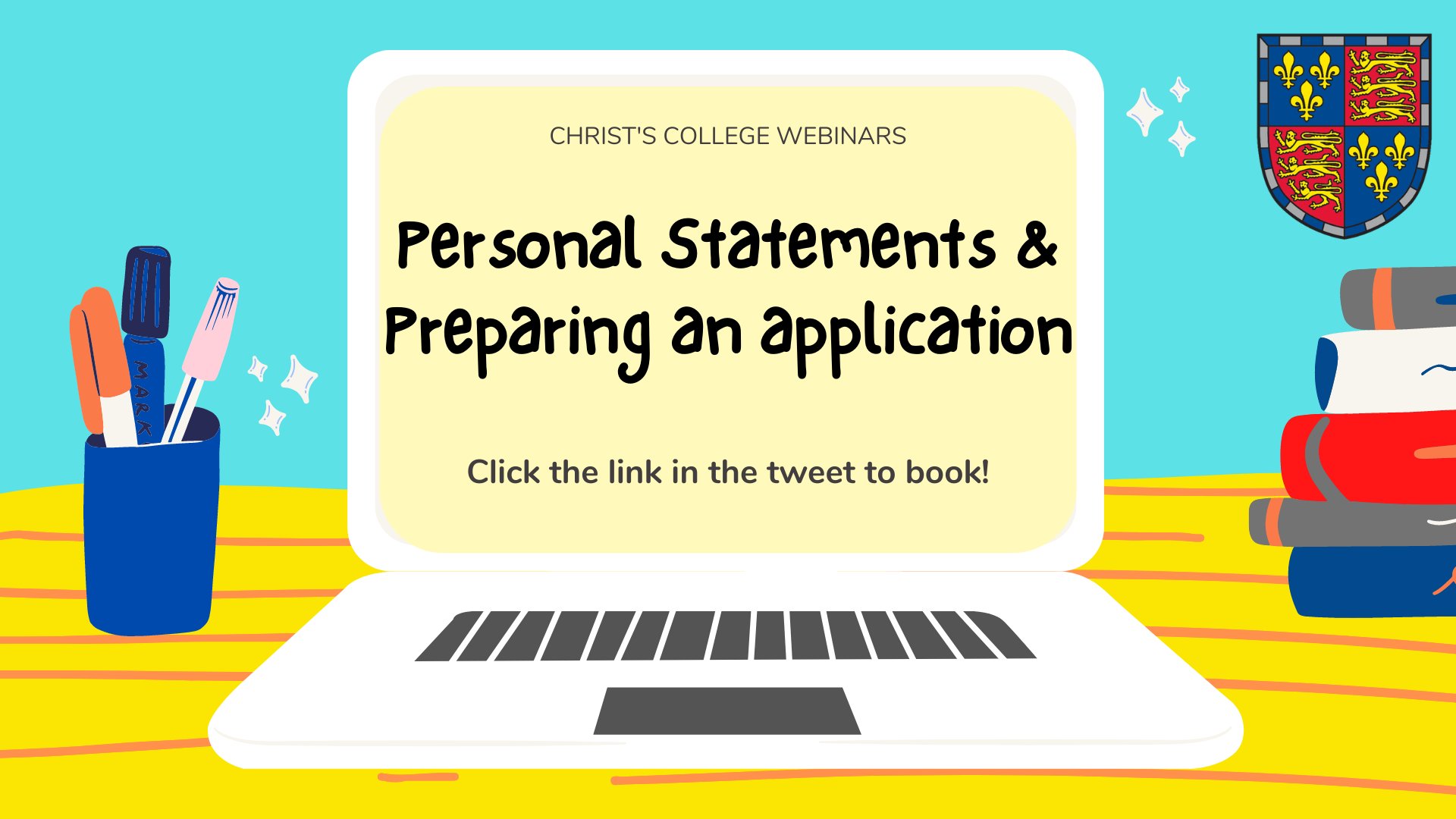
I spent a lot of time stressing about my personal statement: I wish I'd realised that the personal statement is only one small part of the wider application, I could have saved myself a lot of worry. Another piece of advice I would give is to get started early. My initial plan was to write it over the summer before I applied (which would have been an excellent idea), but I ended up doing it at about 3am the night before my school wanted it to be handed in – don't put yourself through that! A lot of my application was done quite last-minute: in terms of college choices, I started looking fairly early, but didn't decide between Christ's and Pembroke until the day before.
The My Cambridge Application form (it was called the SAQ at the time!) was fairly important for Natural Sciences, because the course here is so different to everywhere else. I found out from an outreach event that the additional questionnaire was the place to talk about why I wanted to do the broader Cambridge course, meaning my general personal statement could be tailored towards more specific courses (like Biomedical Sciences) at my other universities. I wrote about my indecisive nature, and why that had made me inclined towards the Cambridge course, and its interdisciplinary nature.
Then I had to prepare for the test, which for my year was the NSAA (this has now been replaced by the ESAT). I also got slightly too stressed about the test (can you spot a common theme, here?). It helped to do a lot of practice questions for that. The frustrating thing about the NSAA was that you felt like you could do all of the questions if you had an infinite amount of time: none of them were mind-blowingly difficult and a lot only required GCSE-level knowledge, especially in the maths component. But in that timed, pressured environment, they did become really tricky. I would recommend practicing for any assessment in a timed setting so you can get a feel for what it's like.
It's worth having a look to see if any sections of your admissions test are the same as tests in other subjects, so you can use their resources. It might have changed since I did it, but I was able to use the maths section from the Engineering test, and some questions from the Medicine test, depending on the sections you do. I also found the Physics and Maths Tutor website provided some really useful resources.
Also, please bear in mind that timing is normally very tight for tests and you may not finish the paper! I remember coming out of the test feeling certain I wouldn't even get an interview because I'd guessed my answers for the last page. Since coming here and chatting to people, I know that a lot of others had exactly the same experience. Like most applicants, I did the exam at school, with nobody around me doing the same paper, so you don't have the reassurance of knowing that others around you found it difficult too. I found myself imagining these hypothetical other applicants who knew exactly what they were doing and got 100%. These 'golden applicants' (if they exist at all!) are very, very rare. Now I'm here, I know that the other applicants were all just like me, but it would have been comforting to see that sooner.
How did you find online interviews?
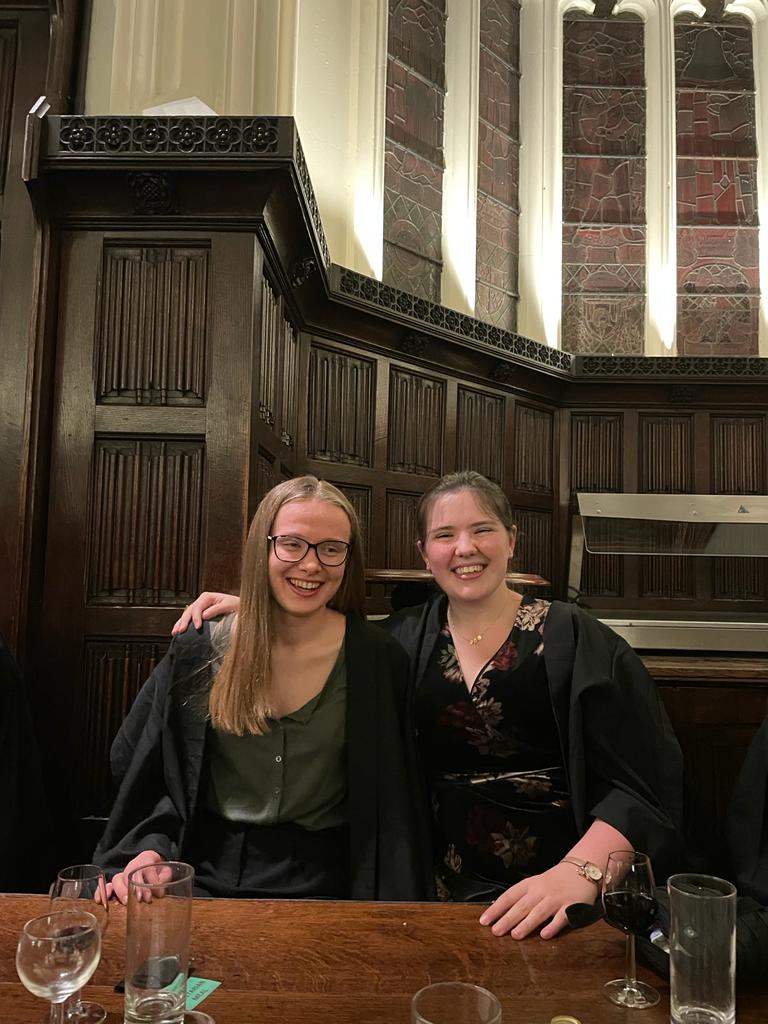 It actually went a lot more smoothly than I'd expected! When I applied there was a lot of advice online for in-person interviews, and not a lot for the online ones, which was frustrating, but in hindsight I realise a lot of the advice for in-person interviews holds for the online ones as well. The way it's set up, with two interviews (usually one based around each of your sciences), is exactly the same, with the exception of you talking to a computer rather than a human. I did a lot of practice talking into a webcam, because that wasn't something I'd done much of before. I remember making my dad call me from upstairs, on his phone, while I sat at the computer and told him about my life, very awkwardly! They warned us that we might have to use an online whiteboard, so I practiced drawing with a mouse. The admissions people sent a lot of helpful emails, and made it clear exactly what we needed to do and prepare.
It actually went a lot more smoothly than I'd expected! When I applied there was a lot of advice online for in-person interviews, and not a lot for the online ones, which was frustrating, but in hindsight I realise a lot of the advice for in-person interviews holds for the online ones as well. The way it's set up, with two interviews (usually one based around each of your sciences), is exactly the same, with the exception of you talking to a computer rather than a human. I did a lot of practice talking into a webcam, because that wasn't something I'd done much of before. I remember making my dad call me from upstairs, on his phone, while I sat at the computer and told him about my life, very awkwardly! They warned us that we might have to use an online whiteboard, so I practiced drawing with a mouse. The admissions people sent a lot of helpful emails, and made it clear exactly what we needed to do and prepare.
The anticipation was worse than the actual interview, to be honest. As soon as I'd logged in, it all went smoothly. The interviewers were lovely, giving me a minute after I'd joined the call to adjust and settle in before they started asking questions. The biggest surprise was how closely the questions stemmed from A-level knowledge in my case. I'd heard stories online about them showing you unusual objects or asking about topics you hadn't heard of before. Obviously, they went beyond A-level content, but every question started within the bounds of things I had learned about at school. I got very flustered: in my maths interview I messed up when dividing something by a hundred! The interviewer was really nice about it, he just said "do you want to rethink that?", and I corrected it and moved on. From talking to academics now I'm here, I think it's okay to make some mistakes. Being able to recognise that and correct yourself just shows that you are teachable.
I don't think I properly appreciated how similar the interview was to a supervision (the very small group teaching that all students get at Cambridge). Although supervisions are a lot less stressful, the interviewers are people who may well teach you when you get here. My interviewers were my current Director of Studies (the academic on your course who oversees your study here) and supervisor for Biology of Cells, my supervisor for Chemistry, my supervisor for Maths, and another person who didn't supervise me, but did supervise my friends who do Earth Sciences. They want to see you do well, and were very understanding that people would be nervous. Even with the virtual whiteboard stuff, they reassured us that it was okay if we couldn't draw exactly what we wanted, as long as we talked through what we were aiming for.
What were you looking forward to about coming to Cambridge, and what were you nervous about?
I was looking forward to pretty much all the same things as any new student looks forward to: seeing new people, the experience of living away from home, and getting stuck into my degree.
I was really nervous about the drinking culture of university, and how easy it would be to make friends without getting involved in that. I don't really drink, and I don't like going out clubbing; I was really worried that all the activities in Freshers' week would involve that sort of thing. As soon as I saw the Freshers' timetable, I was really relieved. There were so many events in Freshers' week that didn't involve drinking, like scavenger hunts, quizzes, freshers' fairs, and college family events. One of my favourites was 'College Monopoly', where we ran around the city trying to get photos of as many colleges as possible. And they made an effort to hold an alternative event whenever there was a drinking-heavy activity going on. For example, whenever College held a 'bop', which is like a school disco for university students, with alcohol, there was a more chill 'alt bop' at the same time, with board and video games (including Mario Kart and Just Dance!), music, snacks and lots of soft drinks. This was the perfect way for me to meet all of the introverts!
How was your Freshers' week?
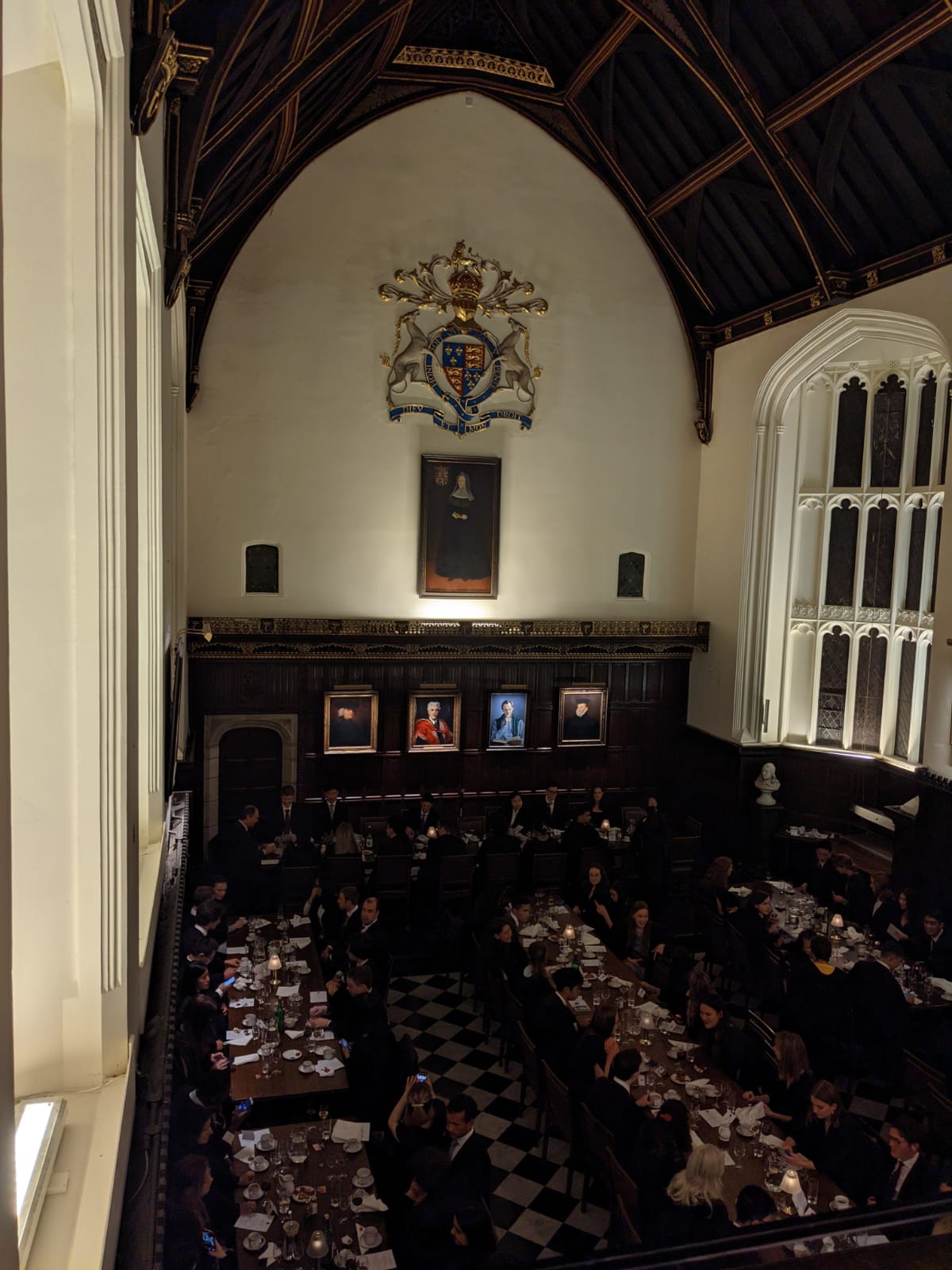
Freshers' week was set up in a way that forces you to make friends: it would be very difficult not to! I met one of my best friends here in the queue to get our Freshers' welcome packs a few minutes after I arrived. I'd barely been in my room for five minutes before my next-door neighbour came to say hello, and then shortly found that my other neighbour was also my college 'sister' and met up with her. I was lucky in that I found a solid group of friends really quickly, but even if people sometimes take a little longer, they do find a crowd within the first term or so. You would have to go out of your way to not make friends, I think.
My favourite memory of Freshers' week was walking into the Great Hall for the first time for our "welcome dinner", which took place on my very first evening in college. Because most of us had applied in 2020/2021 (the Covid-19 pandemic), very few of us had seen Christ's in real life; all of us were just amazed as we walked in. I was sat on the balcony, looking down, and it was at that moment that it hit me I was actually a Cambridge student.
How was starting lectures and supervisions?
They started more gently than I'd expected. The first lecture in each lecture block was basically what we'd covered at A-level, bringing us all up to speed before they start on new content. The same went with our small-group supervisions: they didn't start us on essays straight away, but gave us some short answer questions to do and topics to chat about. All of my lectures were online for the first two terms. They were okay, I didn't realise how much I was missing until I had some in-person lectures after the Easter break. This isn't just the experience of the lecture itself: being able to walk there with friends and chatting about what we'd just learned on the way back was really valuable. There's a lot to juggle, but the workload steadily builds up so that by about week four of your first term, you have about as much work as you ever will.
What's different about your work now, compared to what you did at school?
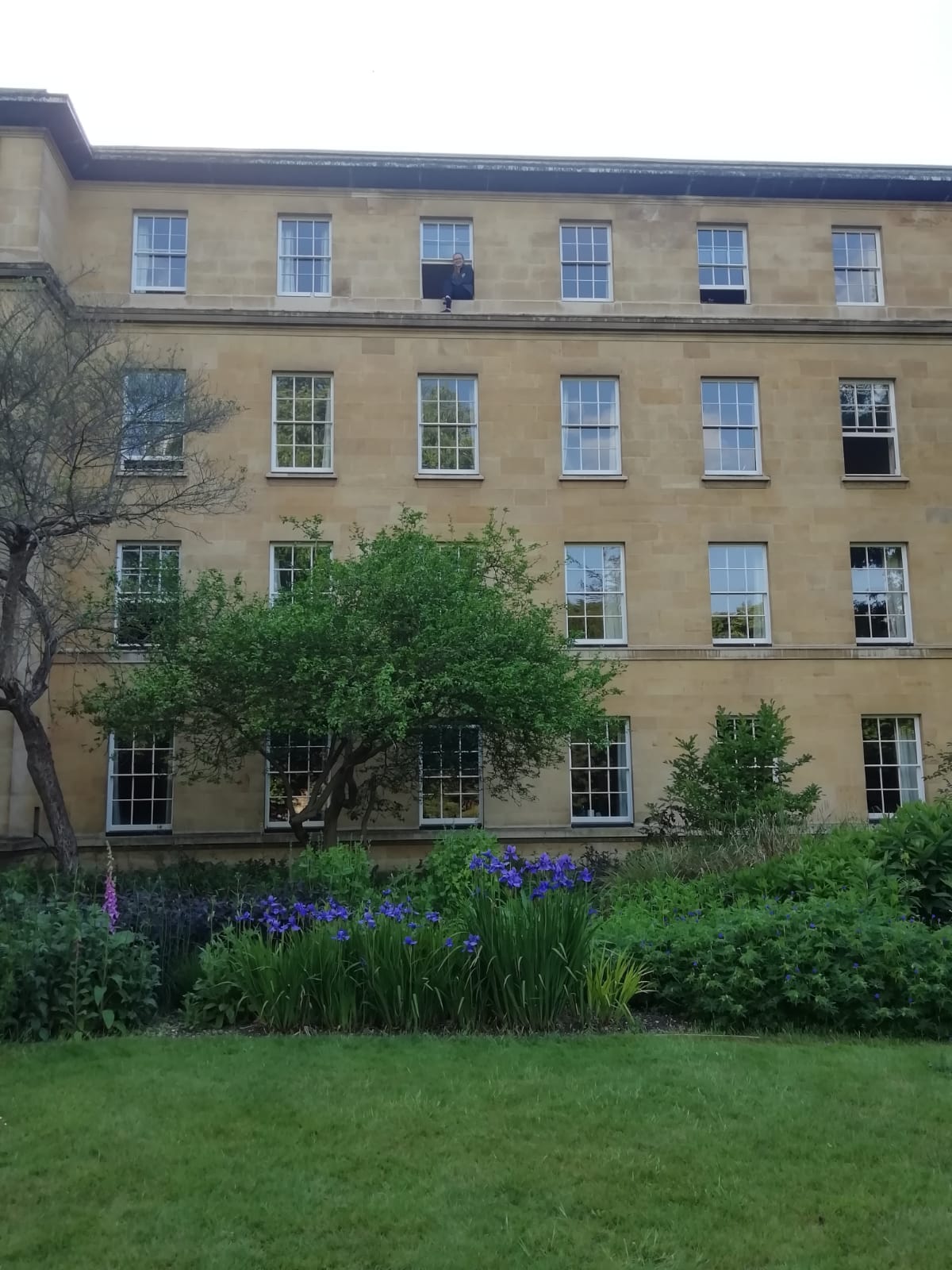
From what I've heard my friends say about their courses, I think Natural Sciences is about as close to school as a Cambridge degree gets. Certainly the structure is a lot like school: in first year you do four subjects which all run totally separately, so it is a lot like doing four A-levels but on a bigger scale. You have twelve lectures a week, four supervisions a week and 1-3 lab sessions a week, so your days are pretty full: much like at school, you need to get up and go to something at 9am most days.
I think the biggest difference is the style of question you're expected to do. As I mentioned earlier, the move to essays was a big jump for me. Also, the absence of a specification and mark scheme was something that really unsettled me: I was one of those annoyingly organised people at school who printed off the list of things on the specification and ticked them off to make sure I covered everything. At A-level, there was a manageable enough amount of content to do that; at university, if I wanted to do that for just one topic, it would take me a day or two to just make the list. There isn't a specification, so anything the lecturer mentions could be assessed. You have to train your brain to realise that you won't learn everything and pick and choose what is important to you, and which questions you'd choose to answer in an exam.
Have you had a favourite topic this year?
Out of the four topics we did this year, my favorite has definitely been the Biology of Cells module. The main reason for this is just because I find the content interesting: I've found myself getting really into the biochemical pathways stuff we covered, and I want to learn more about it.
I've really enjoyed the practical elements of the course too: the labs have got better and more interesting as the year has progressed. We had between one and three lab sessions per week: a Biology of Cells one every week, a Physiology of Organisms one every fortnight (with some bonus plant practicals added in), and a Chemistry one per fortnight. The Biology and Physiology ones lasted about 3 hours, and the Chemistry ones were 11am-5pm with a lunch break. There was also a 'practical' element to the Maths course, which involved coding projects in the language R; we had one of those per week. I wasn't sure what to expect from them, and they are difficult to describe because their content differs so much week-to-week. Each lab has a 'demonstrator', usually a PhD student, who are on hand to help with your experiments. They also read your lab reports to check your understanding: in some subjects, these reports make up part of your assessment. The content generally followed what we were doing in lectures, and are run by the department who runs the lectures. This meant that at various points, the Biology of Cells Practicals were run by the departments of Plant Sciences, Biochemistry, Genetics and Zoology, making them all very different! My favourite series of practicals were probably the genetics practicals (in Lent term) which involved analysing the progeny of yeast and drosophila (fruit fly) crosses.
How do you manage your workload?
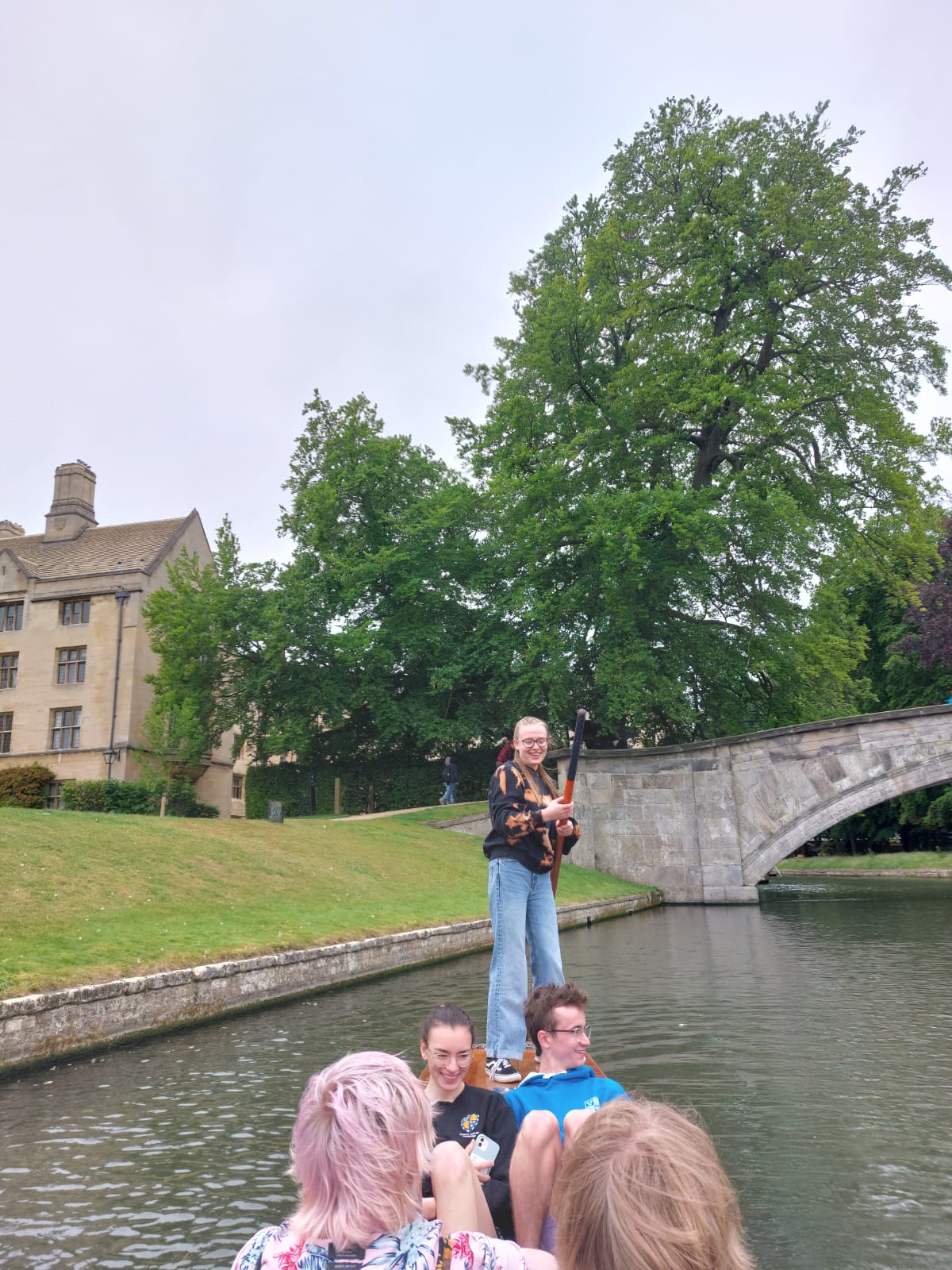
I think this is something every student is still working on! Making some strong friendships in the first couple of terms definitely helped me during exam term, because we were all looking out for each other. We put a timetable up so we knew when each others exams were, and would cook meals for each other when we'd had an exam day. Maybe that sounds like just a small thing, but it was a really important way that we looked after each other. I think Christ's definitely has an atmosphere that fosters some of that care for each other.
Another technique I used in exam term to make sure I didn't work too late was to study in the Plumb Auditorium: the Porters come and kick you out when it gets too late! Plumb Auditorium is one of the rooms College opens up for people to work in during exam season. It's a big airy room with a chandelier in the middle (so it feels very Cambridge) and all the desks facing the same way, very like an exam hall. I liked revising in there because it helped me to get used to being in an exam-like setting; I would move my stuff in there first thing, make myself a cup of tea and work in there for most of the day, leaving my room and the rest of college to be places for relaxing. It also meant that I wouldn't get distracted by my nearby friends, which would happen regularly in my corridor! It's good that College provides a variety of spaces to work in. I don't like working in spaces with background noise (I get distracted far too easily), but my friends that do say that the Buttery is a good place to work.
What's your favourite thing about Christ's?
Unfortunately, I'm going to give the cringey and unhelpful answer: the people. Christ's seems to be set up so you can't walk from one side to the other without meeting somebody you know. It's very different to school in that there are a lot of friendships going between the years, because of societies, subject socials, college families, and the fact all the accommodation is shared. I really like that the whole place is one co mmunity, rather than the year groups making it three separate ones.
mmunity, rather than the year groups making it three separate ones.
If I have to give any more specific answers, I'll say my tutor, Dr Lyon. A tutor is an academic in a subject totally different to yours, whose job is to help with administrative and pastoral issues. She's been lovely and supportive, and the College cats, Finch and Baines, can often be found in her room, which is a massive bonus!
What do you do when you're not working?
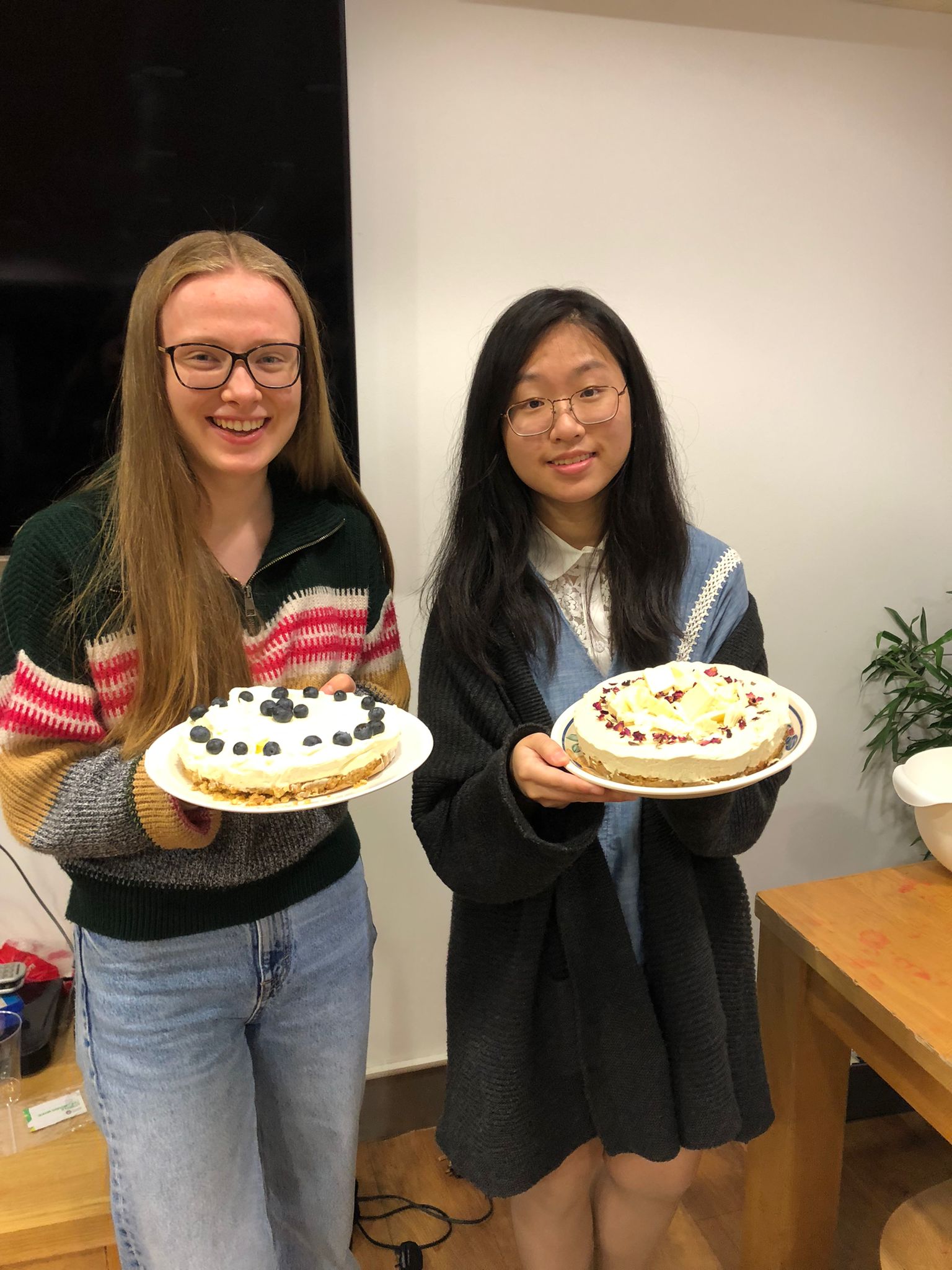
Generally, I prefer disorganised fun to societies and so on. I really like cooking, which has become one of my main social activities. It's a bit of a challenge in the College kitchens, but we make it work. In some ways, the fact that our kitchen was quite small and we had to share facilities forced me to talk to my housemates; things would have been very awkward if we hadn't! We had a system where one of us would cook for everyone, then the next day we would have leftovers, the day after that someone else would cook and so on. I've barely used the College canteen, Upper Hall, since I started last year. Most of my socialising has been based around my housemates: I was very lucky to live next door to someone a bit more extroverted: she would go out, make all the friends, bring them back, and then I would have friends too.
How do you spend your holidays?
Over the Christmas break, I just went home to see my family. I did a few shifts at the part-time job I'd had at sixth form and just enjoyed being back home after the strange experience of starting university. I'll be doing something similar this summer.
For Easter, I used the College's vacation study grant, which meant College paid for my accommodation and food for an extra week, which was very nice and allowed me to enjoy Cambridge and do some studying without the pressures that come with term time.
What are you looking forward to next year?
From an academic point of view, I am looking forward to narrowing down what I want to study a bit more now I've had chance to decide what I want to do. I know I want to do Biochemistry and Molecular Biology, and Cell and Developmental Biology, but am still deciding on my third option; I'm going to wait until my first-year results come out before I finalise my choices.
I'm excited to be living with my friends next year. We're living in a college-owned house on St Andrew's 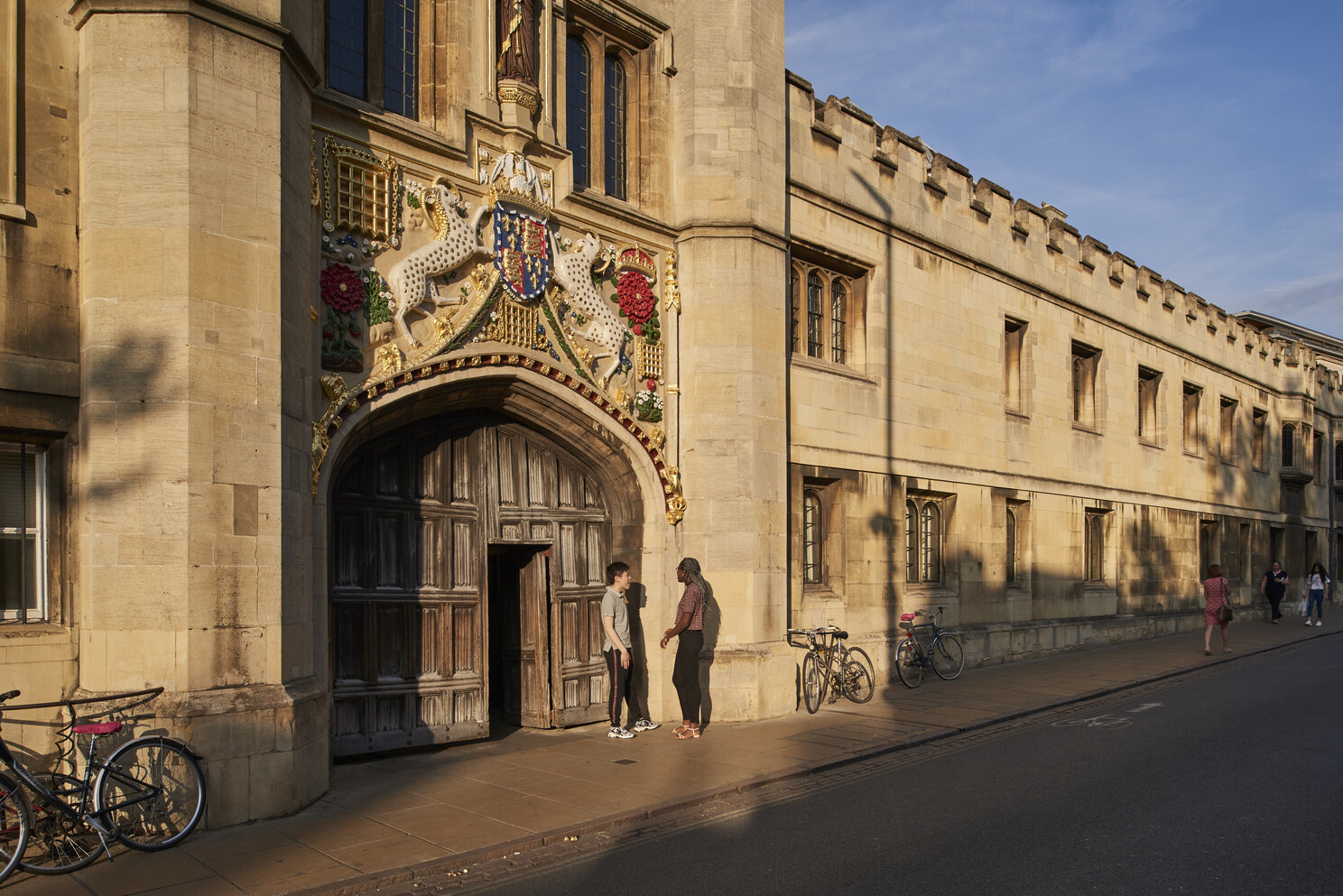 Street, which has a bigger kitchen than the one we had this year. I'm very excited about that, it will make our cooking socials a lot easier. I'm looking forward to having the experience of living with friends, but not being too far from College: the view from my window is of the Great Gate!
Street, which has a bigger kitchen than the one we had this year. I'm very excited about that, it will make our cooking socials a lot easier. I'm looking forward to having the experience of living with friends, but not being too far from College: the view from my window is of the Great Gate!
July 2022
Please be aware if you're considering an application that our student writers describe their experiences. Although the majority of the information stays the same, some details may change from year to year. Do read the student profiles in combination with our undergraduate admissions pages for full information.
Back to Student profiles page / Natural Sciences at Christ's / Next: Emily's profile


